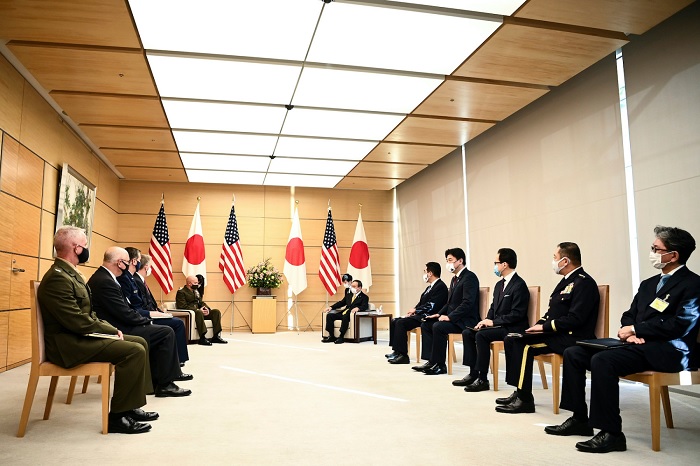
Prime Minister Yoshihide Suga and U.S. Marine Corps Commandant Gen David Berger voiced opposition on Wednesday to China’s increasing assertiveness in the Indo-Pacific region, the Japanese government said.
In a meeting in Tokyo, the two sides shared strong concerns about Beijing’s unilateral attempts to change the status quo in the East and South China seas by force and coercive measures, and agreed to maintain deterrence under the Japan-U.S. alliance, it said.
“We would like to deepen our coordination with the United States by enhancing our response and deterrence capabilities through our bilateral alliance and achieving a free and open Indo-Pacific,” Suga told Berger in the meeting, part of which was open to the media.
“I understand the severe security environment, and that, I think, drives us to move ahead to change, to maintain the deterrence,” Berger said.
The Marine Corps chief said he hopes to listen to the views of the Japanese Self-Defense Forces and the government to find ways to enhance the partnership with Japan.
The two also reaffirmed the importance of reducing the burden on Okinawa, which hosts the bulk of U.S. forces in Japan, according to the government.
Later in the day, Berger met with Foreign Minister Toshimitsu Motegi and Defense Minister Nobuo Kishi.
During his meeting with Motegi, the two sides reaffirmed their commitment to realigning U.S. forces in Japan, including the planned relocation of U.S. Marine Corp Air Station Futenma from a residential area of Ginowan in Okinawa to the less populated coastal area of Henoko in Nago and transferring some Marine Corps personnel to the U.S. Pacific territory of Guam.
They also agreed on the importance of enhancing solidarity with countries such as Australia and India, according to the government.
 Eurasia Press & News
Eurasia Press & News



